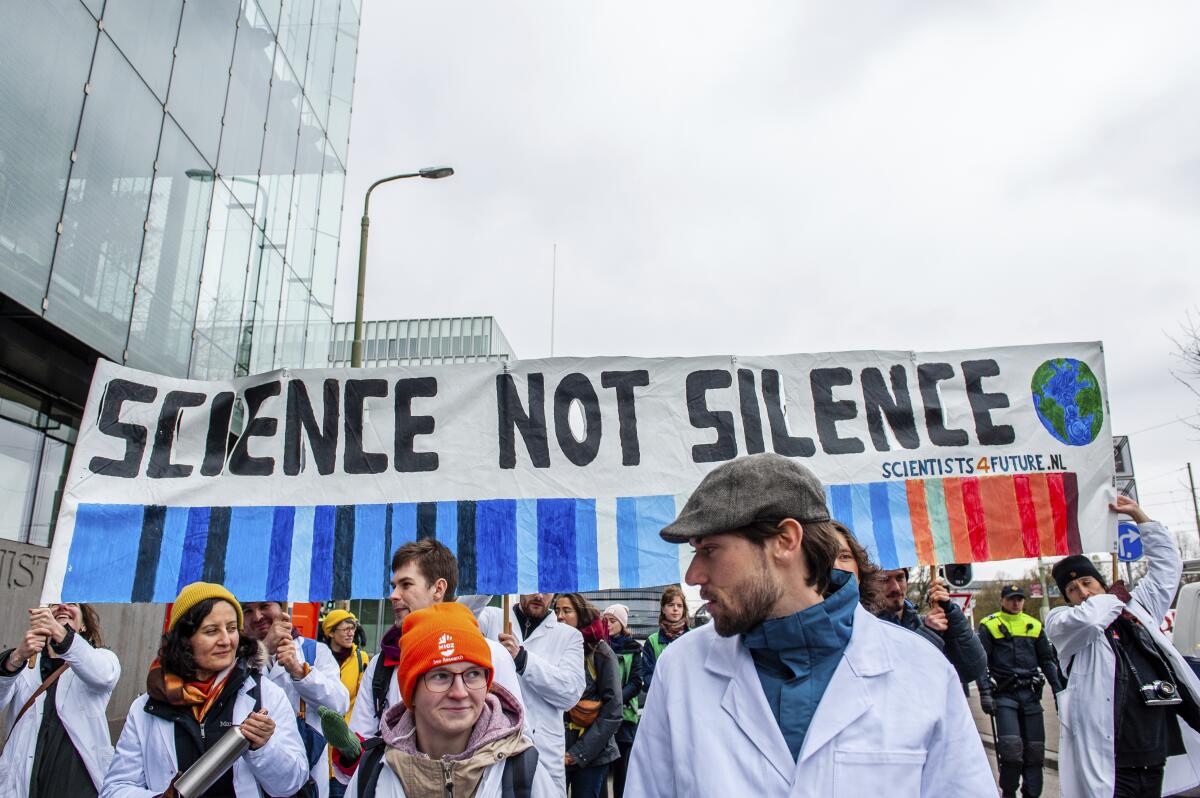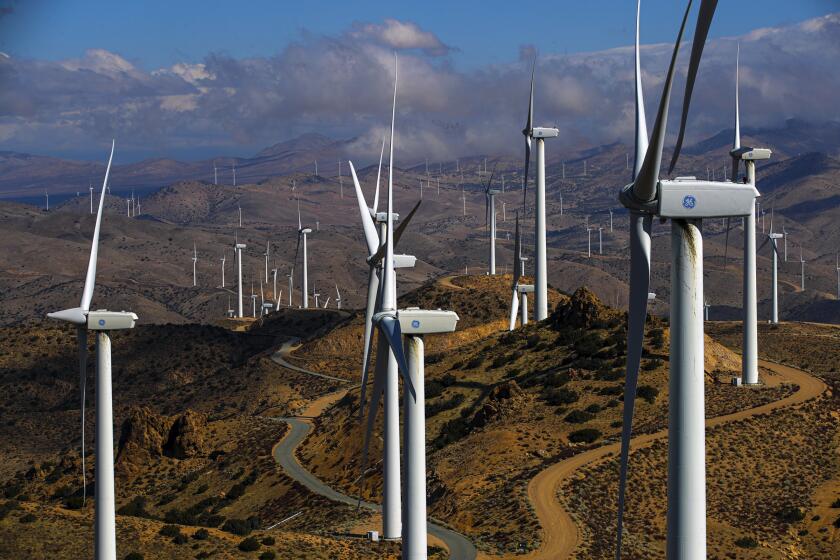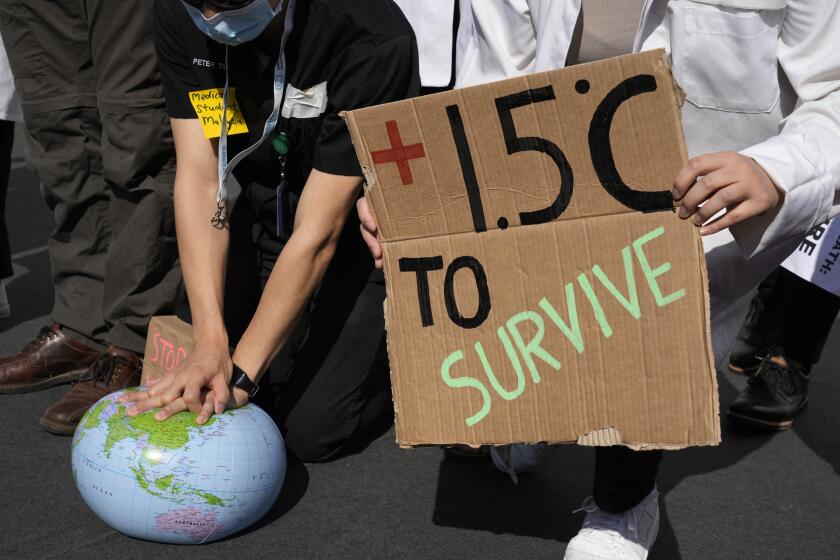Column: Can scientists moonlight as activists — or does that violate an important ethical code?

- Share via
Peter Kalmus, a climate scientist with NASA’s Jet Propulsion Laboratory, chained himself to the doors of the Wilson Air Center in Charlotte, N.C., last week as part of a protest against private jets and the carbon emissions they spew. He and several colleagues were arrested, handcuffed and charged with trespassing. Around the world, some 80 scientists participated in the day of protest.
“I feel like the failure of society to respond logically and rationally to the findings of climate science frankly puts my children into direct danger,” Kalmus told me. “It would just be really weird if I responded to that like a vegetable and didn’t do anything about it.”
Allan Chornak, a wildlife biologist who (along with Kalmus) chained himself to a door of the JP Morgan Chase building in April in downtown Los Angeles, said something similar before being arrested by Los Angeles police and briefly jailed. He and other scientists were protesting the company’s role in financing the fossil fuel industry.
Opinion Columnist
Nicholas Goldberg
Nicholas Goldberg served 11 years as editor of the editorial page and is a former editor of the Op-Ed page and Sunday Opinion section.
“We’ve tried being unbiased, we’ve tried being silent, we’ve tried the policy game...,” said Chornack about his fellow scientist-activists, 1,000 of whom reportedly participated in April and May protests globally. “We have tried everything!”
Kalmus, Chornak and their colleagues believe it is their moral responsibility as scientists to help awaken society to the dangers of climate change, which include not just more of the raging storms, droughts, wildfires and heat waves we’re already experiencing, but very possibly famine, mass migration, collapsing economies and war.
I think they’re right.
But as more and more scientists have become engaged in climate activism over the years, they have faced pushback from traditionalists who insist that scientists should be disinterested, impartial “seekers of truth” who keep their opinions to themselves, thank you very much.
The California Air Resources Board has released its long-awaited scoping plan, a roadmap for the state to drastically cut its carbon emissions.
Because, after all, science is the domain of facts, not emotions, where open-mindedness and objectivity are at the very core and foundation of the work. Political advocacy is frowned upon.
This is not an unreasonable or unfamiliar argument.
The scientific method itself is built on the notion of “values-free” thinking, which is presumed to lead to more honest, more credible results. For hundreds of years, scientists have embraced empiricism and impartiality through processes like measurement and quantification, and repetition and verification. And through random sampling and double blind trials designed to weed out bias and boost credibility.
Scientists with ideological axes to grind and preconceived points of view can compromise outcomes or diminish public confidence in results, goes the argument.
“I believe advocacy by climate scientists has damaged trust in the science,” wrote University of Bristol climate scientist Tamsin Edwards in a much-discussed article in the Guardian 15 years ago. “We risk our credibility, our reputation for objectivity, if we are not absolutely neutral.”
She also said scientists have to be vigilant against what she called “stealth issue advocacy” — “claiming we’re talking about science when really we’re advocating policy.”
Edwards believes that science belongs to the scientists and policy should be left to the policymakers. I see the point, and in a perfect world, I might agree. But these days Kalmus (who is a member of a group called Scientist Rebellion) and his colleagues have the stronger argument.
The situation has become too desperate. We’ve reached a point in the climate crisis where silence actually is a kind of complicity. Neutrality is a cop-out.
Government ministers are returning to Egypt to take over negotiations at the U.N. climate summit, giving diplomats important political backing.
Like the rest of us, scientists are human beings, with opinions, emotions and social consciences. Those who choose to be engaged citizens have a right to do so.
Kalmus says he keeps his politics out of his work. And when the findings of climate scientists are being ignored by world leaders and misrepresented by corporations, what moral choice do he and his colleagues have other than to speak up on their own time?
And who has the ability to speak with more authority than the experts themselves?
“Like all scientists, we were trained to maintain a type of neutrality in all things…,” Rose Abramoff, a climate scientist who was also arrested last week in North Carolina, told a local reporter. “But we do speak from a place of greater credibility because of our educational background, and because of our training in the climate sciences.”
I don’t believe activism has to taint a scientist’s work or detract from its credibility. If Kalmus, Abramoff and Chornak follow the facts where they lead in their day jobs, then what’s wrong with off-hours political engagement designed to call attention to their work and its ramifications? (You can agree or disagree with the decision to engage in civil disobedience, but that’s a separate issue.)
One more point: It’s not the protesting scientists but their opponents who have politicized climate science. The fossil fuel industry has spent billions of dollars over half a century to sow misinformation and cover up or minimize what the science tells us about emissions and global warming. If legitimate researchers now chain themselves to a few doors to counter the slick, well-heeled industry shills and to express the consensus view of the scientific community, they’re unpoliticizing the issue, if anything.
The simple truth is that policymakers around the world are utterly failing to address the climate crisis with the urgency it demands, and ordinary people are inadequately informed and insufficiently focused on the impending perils.
When scientists advocate for honest, rational, science-driven solutions without compromising the quality of the work they do in their day jobs, we’re all in their debt.
More to Read
A cure for the common opinion
Get thought-provoking perspectives with our weekly newsletter.
You may occasionally receive promotional content from the Los Angeles Times.














